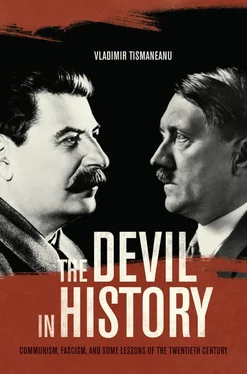Aron, Raymond, Démocratie et totalitarisme ; Memoirs
Attali, Jacques
Auster, Paul
authoritarianism: bureaucracies; “competitive authoritarianism,”; democratic (liberal) socialism vs.; East and Central Europe; Leninism; Marxist components; Marx’s personality; neo-authoritarianism; post-Communism; pre-Leninist; Putinist; radical-authoritarian trends; Russian traditions; salvationist; Stalinist; Western post-Marxism vs., See also totalitarianism
Azerbaijan
Bacilek, Karol
Badiou, Alain
Bahro, Rudolf
Bakunin, Mikhail
Balbo, Italo
Balkans: Stalinist agenda; Western, See also Albania; Croatia; Serbia
Baltic states: Gorbachev and use of force in; impersonal democratic procedures; Nazi and Soviet mass killings; Soviet/Russian occupation. See also Latvia; Lithuania
Banac, Ivo
Bartov, Omer
Băsescu, Traian
Bauman, Zygmunt
Baumler, Alfred
Bayer, Wilhem-Raymund
Belarus: “competitive authoritarianism,”; Holocaust impacts; human rights
Belgrade, April student protests
Beniuc, Mihai
Benjamin, Walter
Berdyaev, Nikolai
Bergelson, David
Berlin, Isaiah
Berlin Wall, fall of
Berman, Jakub
Berman, Paul
Bernstein, Eduard
Bernstein, Leonard
Besançon, Alain
Big Lie: Communist; post-Soviet. See also amnesia; falsification; truth
bin Laden, Osama, Al Qaeda
biological distinctions: Nazi. See also ethnocentricity
The Black Book of Communism
Blanquism
Bloch, Ernst
Blomberg-Frisch affair
Blum, Léon
Bogdanov, Aleksandr
Bohemia: Communist Party; and patrimonial legacy
Bolshevism; Communist Manifesto and; conversion of; converting into an emerging version of Communist-Fascism; critics; cult of the party; cult of totality; de-Bolshevization; Declaration of the Rights of Toiling and Exploited People (1918); vs. democracy; dream of total revolution; Fascism vs.; Gorbachev and; humanism; ideology; Judeo-Bolsheviks; justice subordinated to party interests; “language of magic,”; Menshevik split with; messianism; mission; “modern agenda of subjectivization,”; and morality; New Faith; norms of culture of; October Revolution (1917); Old; party charisma; political “sins,”; post-Soviet Russia; revolutionary passion; Stalinistnationalist traditions of; “substitutionism,”; takeover of power; terror; victory in the civil war. See also Communist Party; Communist utopia; Leninism; Stalinism; vanguard party
Bonapartism
Bonner, Elena
Borkenau, Franz
Bormann, Martin
Bosworth, R. J. B.
Botez, Mihai
Bourdieu, Pierre
bourgeoisie; both Communism and Fascism vs.; Communism vs.; Fascism vs.; Jewish
Bracher, Karl Dietrich
Brandenberger, David
Brandt, Willy
Brașov workers’ protest movement
Brezhnev, Leonid
Brown, Archie
Browning, Christopher
Brzezinski, Zbigniew
Budapest, neo-Marxist School/Petöfi Circle
Buhr, Manfred
Bukharin, Nikolai; The ABC of Communism (with Preobrazhensky); Economics of the Transition Period ; “To a Future Generation of Party Leaders,”
Bukovsky, Vladimir
Bulgaria: Danubian confederation; extermination camps and mass executions; “High Stalinism,”; Mladenov; post-Communism; working class passivity
Burlatsky, Fyodor
Burrin, Philippe
Calmanovici, Emil
camps: Communist; extermination; Hell on earth; labor; Nazi. See also gulag
Camus, Albert
capitalism: Communism vs./“capitalist encirclement,”; Eastern Europeans vs.; liberal; Nazism vs.; Westerners vs., See also market economies
care of the soul
Castoriadis, Cornelius
Castro, Fidel
Cathala, Jean
Ceaușescu, Nicolae: charismatic leadership; civil society; “Great Helmsman,”; Manea persecution; post-Communism and; Răutu and; singing International while dying; Stalinism; Tudor as court poet
CEMA (Council for Economic Mutual Assistance)
Central Committee: Luxemburg on; Romanian Workers’ Party; Socialist Unity Party (SED)
Central Committee of the CPSU; Jakub Berman; Bukharin; Cultural Department; Frolov; Gorbachev and; Lenin letters (September 1917); notorious resolutions; Piatakov; Plenum (1937); republican elections (1990)
charismatic politics: post-Communist. See also leader charisma/personality cult; mysticism; party charisma
Charter Czechoslovakia
Chávez, Hugo
Cheka
Chernenko, Konstantin
Chernyaev, Anatoly
Chernyshevky, Nikolai, “Crystal Palace,”
Chesterton, Gilbert K.
chiliasms: Communist Manifesto ; Communist Party; fantasies of salvation; Fascism; Leninism; revolutions (1989-91) and. See also eschatology; millennialism
China; anti-Fascism and imperialist propaganda of; Chinese propaganda; contemporary; Cultural Revolution; “High Stalinism,”; Leninist parties coming to power; mass murder. See also Mao Zedong
Chirot, Daniel
Chișnevschi, Iosif
citizenship: Communism abolishing; Fascism eroding; nationalist “thick” notion of; revolutions (1989-91) and rebirth of, 1901. See also civil society
civilization: Communism; Nazism
civil society: and anti-Semitism; Communist disintegration of; despotism’s destruction of; dissidents and new epoch of; “institutional amphibiousness” causing; Marx on state and; nationalism competing with; post-Communism and; revolutions (1989-91) and; Russia’s “gelatinous,”; sixties upheavals and; uncivil society. See also citizenship; civilization
class consciousness; Lenin and; Marx and. See also bourgeoisie; proletariat
“class genocide,”
“class instinct,”
class murder (“sociocide”)
class struggle; East European Communist leaders and; Gorbachev and; Leninist; Marxist; Soviet and Yugoslav visions; Stalinist. See also proletariat; revolutionary class
Clementis, Vladimir
Cohen, Stephen E.
Cohn, Norman
Cold War
Cominform (Communist and Workers’ Parties)
Comintern (Third Communist International); Dimitrov; on Fascism; Geminder; propaganda machine
command economies
Communism; anomy; anti-Fascist; anti-Nazi resistance movements; The Black Book of Communism ; conversion to; deradicalization; differences between Fascism and; as ecclesiology; evil identified by; ideology; l’illusion lyrique ; intentionality; Jacobinism; leader charisma/personality cult; messianism; “mismemory of,”; and morality; neo-Communism; New Man; “People-as-One,”; public and private person; redemptive mythologies; revisionism; revolutionary passion; science and; similarities with Fascism; social engineering; three layers in societies of. See also Bolshevism; Communist criminality; Communist Party; Communist utopia; enemies; hegemony; internationalism; Leninism; Marxism; post-Communism; Soviet Union
Communist criminality: compared with Fascism; dissidents vs.; Gorbachev denouncing Stalin for; Khrushchev denouncing Stalin for; memory/amnesia/silence about; moral blindness toward; number of victims; post-Communism and; purges; radical evil; Romania; Soviet Union; Stalin’s crimes against the party; suffering under; terror; utopia and; violence sanctified
Communist heroic ethos; Bolshevik; Leninism; Marxist; Stalinist; War Communism and “building of socialism,”
Communist Manifesto (Marx and Engels); vs. bourgeoisie; vs. capitalism; class struggle; Ianoși and; millenarian redemption; monism, proletarian development; social democracy and; violence glorified by
Communist Party: Albanian; Big Lie; Bohemia and Moravia; Cominform (Communist and Workers’ Parties); Comintern and; Czechoslovak; German (KPD); ideological hegemony; Jews in; party charisma; Polish; post-Communism and; revisionism and; Romania; Russian; Russian Federation; Spanish; Western; Yugoslavia. See also Central Committee; Communist Party of the Soviet Union (CPSU); Congresses; factionalism; Politburo; vanguard party
Читать дальше












